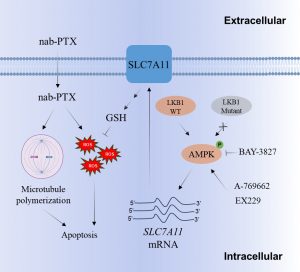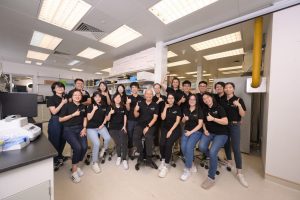A research team led by Shen Hanming, chair professor in the Faculty of Health Sciences (FHS) at the University of Macau (UM), has made significant progress in the study of drug resistance in non-small cell lung cancer (NSCLC). The team has discovered the mechanisms behind some NSCLC patients’ resistance to albumin-bound paclitaxel (nab-PTX), an important chemotherapeutic drug. Their findings provide novel insights for the development of new therapeutic strategies to overcome such resistance. The research has been published in the international journal Redox Biology.
Lung cancer is one of the most frequently diagnosed cancers, and remains the leading cause of cancer-related death worldwide. NSCLC is the main type of lung cancer, accounting for about 85% of all cases. Nab-PTX is an important chemotherapy drug used to treat advanced NSCLC, but its clinical efficacy is greatly limited by drug resistance. Therefore, it is crucial to understand the underlying mechanisms and to develop effective strategies to overcome resistance and enhance the therapeutic efficacy of nab-PTX.
Through a series of cell biology experiments and xenograft mouse models, the research team made a groundbreaking discovery. They found that liver kinase B1 (LKB1), which is traditionally considered a tumour suppressor, contributes to nab-PTX resistance in NSCLC. Using RNA sequencing, the team discovered that the AMP-activated protein kinase (AMPK) signalling pathway was significantly upregulated in NSCLC cells with expression of wild-type LKB1. Subsequent experiments confirmed that LKB1 promotes the expression of SLC7A11 by activating AMPK, thereby increasing the intracellular level of glutathione (GSH), a key antioxidant. GSH eliminates the reactive oxygen species (ROS), which cause oxidative stress and cell death, ultimately weakening the therapeutic effect of LKB1. The team also discovered that combining nab-PTX with an AMPK inhibitor increases the therapeutic efficacy of nab-PTX in both in vitro and in vivo models. These findings provide new ideas for developing new therapeutic strategies to overcome nab-PTX resistance in NSCLC.
The first author of the study is Rong Dade, a doctoral student in FHS. Prof Shen; Lu Guang, associate professor in the Zhongshan School of Medicine at Sun Yat-sen University; Ling Zhiqiang, director of the Experimental Research Center at Zhejiang Cancer Hospital, also contributed to the study. The research was supported by the Genomics, Bioinformatics and Single Cell Analysis Core, the Biological Imaging and Stem Cell Core, and the Animal Research Core of FHS. It was also funded by UM (File No.: CPG2023-00032-FHS, CPG2024-00035-FHS, MYRG2020-00022-FHS), and the Science and Technology Development Fund of the Macao SAR (File No.: 0078/2020/A2, 0031/2021/A1, 0081/2022/AMJ, 0004/2021/AKP). The full version of the research article is available at: https://www.sciencedirect.com/science/article/pii/S2213231725000801.
| Source: Faculty of Health Sciences | |
| Media Contact Information: | |
| Communications Office, University of Macau | |
| Albee Lei | Tel: (853) 8822 8004 |
| Bell Leong | Tel: (853) 8822 8009 |
| Email: | prs.media@um.edu.mo |



